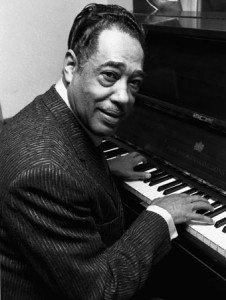Jazz Commentary Drill Down: Duke Ellington’s “New World A-Coming”
Steve Elman is currently surveying works that illuminate the tradition of the jazz-influenced piano concerto. His series began with an examination of Chick Corea’s current recording, The Continents. In part two, he takes a look at eight works by jazz composers that precede the release of Corea’s work. This post is a detailed examination of one of the works discussed in part two.
Duke Ellington: New World A-Coming (1945) – Ellington, p; Duke Ellington Orchestra (Rec. Evansville, IN, 6/16/45) [from A Date with the Duke, Vol. 5 LP]
Length: 13 minutes
In his verbal introduction to the piece, Ellington clearly says “coming” with a hard g, so other spellings of the title that use an apostrophe at the end are incorrect. He also says that it was written “in realization of the beautiful things to come.”
There are five principal musical motifs. There is no improvisation to speak of, but there may be a short improv section (see below). There are no movement breaks.
At the beginning, a wistful, six-note motif is introduced in a straight swing feel, but lightly. The first piano statement explores this motif with arpeggiated decoration. Duke plays this with great feeling.
Baritone saxophonist Harry Carney leads the sax section in a very creamy lead-in to the second motif—chords in mid-range with arpeggios. The band gets a chance to work out a bit of this thematic material, and then loping low notes in piano introduce the third motif—a somewhat sinister theme but funny and dancy too.
A short orchestral passage follows, then another piano statement, followed by an orchestral workout with piano under. Orchestration is particularly lovely here.
The piano introduces the fourth motif, a fast, dancy theme, with Sonny Greer providing brushes under. Then the fifth motif, Duke’s trademark, both-end piano chords.
The third and fourth motives come back in as the piano part progresses. Then the first and second make brief appearances.
The saxes have a reharmonized statement of first motif, and then Duke has a passage that seems a bit improvised over the saxes.
Another solo piano passage blends several of the motives—the third comes back slower, sadder, reharmonized.
Momentum builds, as the orchestra gets several of the motifs woven together, in very dense harmony. The fifth motif, in the piano part, leads back to a simple statement of the first motif, again very beautifully played.
The piece comes to a climax with an almost direct quote of the concluding chords of Richard Rodgers’s “You’ll Never Walk Alone,” blending in the first motif and a hint of one other.
The orchestra drops out and the piano has the fifth motif again, leading into a dramatic resolution with a final full-ensemble chord.
Steve Elman’s four decades (and counting) in New England public radio have included ten years as a jazz host in the 1970s, five years as a classical host in the 1980s, a short stint as senior producer of an arts magazine, thirteen years as assistant general manager of WBUR, and currently, on-call status as fill-in classical host on 99.5 WCRB since 2011. He was jazz and popular music editor of The Schwann Record and Tape Guides from 1973 to 1978 and wrote free-lance music and travel pieces for The Boston Globe and The Boston Phoenix from 1988 through 1991.

